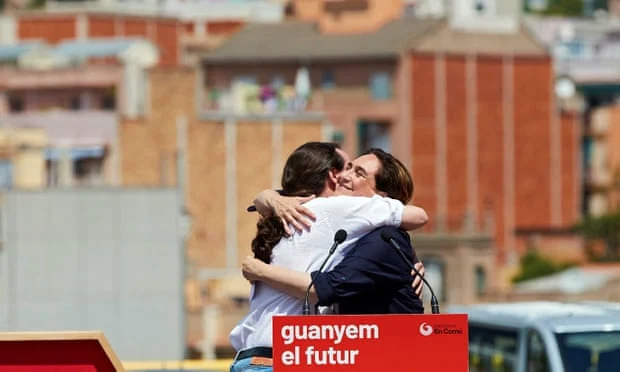‘Super Sunday’ of city, regional and European elections could inflict further damage on traditional party of Spanish right
 |
| Socialist party prime minister Pedro Sánchez with deputy PM Carmen Calvo, left, and the party’s Andalucían leader, Susana Díaz, right, at a campaign event in Córdoba |
Spain is heading to the polls for a “super Sunday” of European, regional and municipal elections this weekend that will see Madrid and Barcelona’s city councils up for grabs and the socialist PSOE party hoping to repeat its victory in last month’s general election.
Twelve of Spain’s 17 autonomous regions will be voting to choose new governments, including the Madrid region, which has been in the hands of the conservative People’s party (PP) since 1995, despite a series of corruption scandals.
The PP suffered a drubbing in April’s general election after its strategy of moving to the right in a bid to see off the far-right Vox party backfired spectacularly.
The PP, led by Pablo Casado, is now trying to stake a claim to the centre ground in the hope of retaining its status as the main party of opposition amid competition from the centre-right Citizens party.
But the U-turn may not be enough to guarantee its hold on the Madrid region. Recent polls suggest that a leftwing coalition of the PSOE, the anti-austerity Unidas Podemos and the More Madrid platform, could secure a majority in the 132-seat regional parliament.
Such a result would prove another disaster for both Casado and the PP.
Madrid’s progressive mayor, the former judge Manuela Carmena, has joined forces with Iñigo Errejón, once No 2 in Podemos, and the two are running on a joint ticket: Carmena for the mayoralty and Errejón for the leadership of the Madrid regional government.
 |
| Madrid mayor Manuela Carmena receives the Champions League trophy at City Hall |
Carmena has warned that Vox, which won its first seats in the national parliament last month, will drag Spain back to the past.
“Being against progress is being against life,” she said this week. “It is the engine of humanity. We want to carry on being the locomotive of progress in Spain, Europe and the world.”
Vox, meanwhile, is hoping a hardline approach will attract voters from the more traditional wing of the PP.
Although it picked up 24 seats in the general election, it failed to live up to expectations, perhaps because it relied too heavily on social media campaigns as it sought to circumvent the traditional media.
The party has promised to build an “unbreachable wall” to keep migrants out of Spain’s North African enclaves of Ceuta and Melilla, while its Madrid candidates have denounced abortion and a woman’s right to choose.
One of Vox’s candidates for the European elections has continued the party’s attack on feminism, comparing “all those ugly feminists who tell Spanish women what they have to do” to Cinderella’s stepmother and stepsisters.
The contest for the Barcelona mayoralty is a two-horse race between the incumbent, Ada Colau of Barcelona En Comú, and the Catalan Republican Left (ERC) candidate, Ernest Maragall.
The latest polls show the two neck and neck, with the socialist party’s Jaume Collboni in third.
 |
| Podemos leader Pablo Iglesias hugs Barcelona mayor Ada Colau |
Colau, whom her opponents blame for many of the city’s ills, from high rents to rising street crime and the proliferation of stateless street vendors, has a loyal base of voters.
Last week she received a boost in the form of an open letter to the city’s electors urging them to vote for her. It was signed by, among others, Noam Chomsky, Naomi Klein, New York mayor Bill de Blasio and the economist Thomas Piketty.
Maragall has two things in his favour: the increasingly solid vote for the ERC, now the pre-eminent pro-independence party, and his name. His brother Pasqual was a popular mayor from 1982 to 1997 and is credited with transforming the city into one of the world’s top tourist destinations.
The wild card is the former French prime minister Manuel Valls, who has struggled to convince voters that he has the credentials to be mayor. Although his father is Catalan and he was born in the city and speaks the language, he has never lived in Barcelona and to many he is a carpetbagger whose political career in France has run into the sand.
Colau is campaigning on her record of increased public spending, reducing air pollution, closing 4,500 illegal tourist apartments, establishing a municipal electricity company and measures to build more nursery schools and increase the public housing stock.
For Catalan secessionists Barcelona is both the weak link and the big prize. With about two-thirds of the population made up of either recent immigrants or people of non-Catalan Spanish ancestry, support for independence is lukewarm.
Colau is not not a secessionist but does favour a referendum on independence. “I will never accept that the politics of Barcelona should be subordinate to the national or independence question,” she told El País.
“Catalonia is not a republic and so Barcelona can’t be the capital of a non-existent republic.”
On Friday, the governing body of the Spanish parliament suspended four Catalan MPs who won seats in the general election but who remain on trial for their alleged roles in the regional government’s attempts to secede from Spain in 2017.
The four will now have to decided whether they resign their seats to hand them to colleagues, or leave them empty.











0 Comments:
Post a Comment